To keep your dog healthy and happy, focus on a balanced diet full of essential nutrients. This includes proteins for muscle development, fats for energy and a healthy coat, and carbohydrates for extra energy. Don't forget vitamins and minerals, like calcium for strong bones. Always check food labels for quality ingredients. Whether you choose homemade or commercial food, guarantee it meets nutritional standards. Hydration is key too, so provide fresh water daily. Customize the diet to your dog's age and activity level for ideal health. There's plenty more to explore about keeping your furry friend thriving!
Essential Nutrients for Dogs
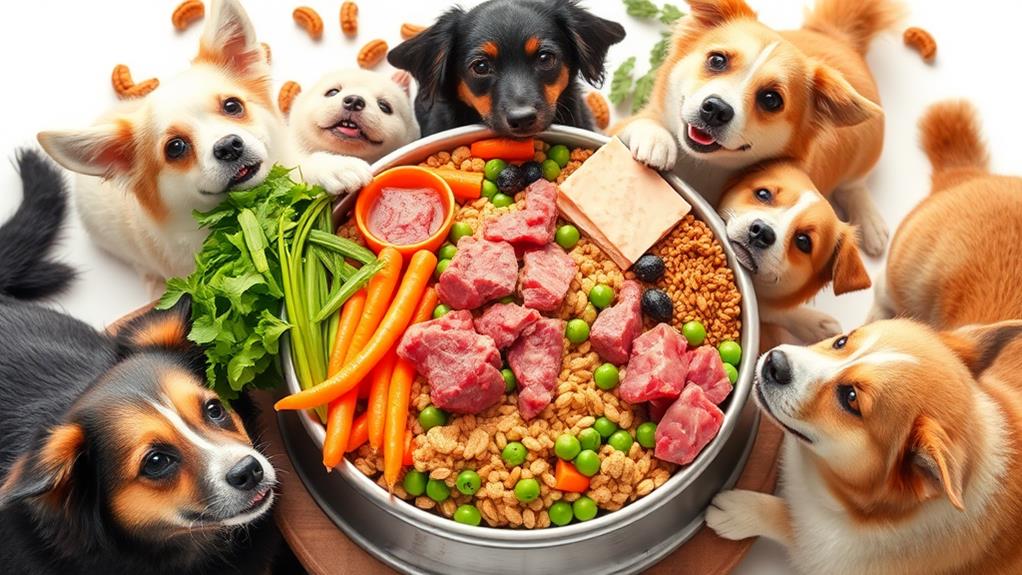
To keep your dog healthy and happy, it's indispensable to understand the essential nutrients they need. Dogs require a balanced intake of proteins, fats, carbohydrates, vitamins, and minerals to thrive.
Proteins are fundamental for muscle development and repair, so make sure to include high-quality sources like meat, fish, or eggs in their diet.
Fats provide energy and support healthy skin and coat. Look for sources of omega-3 and omega-6 fatty acids, which can help maintain your dog's overall health. Carbohydrates, while not essential, offer additional energy and can come from ingredients like whole grains and vegetables.
Vitamins and minerals play key roles in various bodily functions. Vitamins A, D, E, and K are pivotal for vision, bone health, and immune function, while minerals like calcium and phosphorus support strong bones and teeth.
Ensure you're providing a variety of these nutrients to keep your dog in top shape. Always consult your vet before making significant changes to your dog's diet, as they can provide tailored recommendations based on your pet's age, breed, and health needs. With the right nutrition, your dog will feel energetic and vibrant!
Importance of Balanced Diet

A balanced diet is essential for your dog's overall health and well-being. When your pup receives the right mix of nutrients, it supports their immune system, energy levels, and maintains a healthy weight. Just like humans, dogs need a variety of proteins, carbohydrates, fats, vitamins, and minerals. Failing to provide this balance can lead to deficiencies or excesses that harm their health.
You might think that any dog food will do, but not all diets are created equal. A balanced diet helps guarantee your dog has the energy to play, explore, and enjoy life. It also promotes a shiny coat, strong bones, and optimal organ function. When your dog eats well, you may notice improved digestion and fewer health issues.
Additionally, a balanced diet can contribute to longevity. Dogs that receive proper nutrition tend to live healthier, happier lives, reducing the risk of chronic conditions. Remember, it's not just about filling their bowl; it's about providing quality nutrition. Always consult with your vet to determine the best dietary plan tailored to your dog's specific needs, age, and activity level. Your furry friend deserves nothing less!
Understanding Dog Food Labels
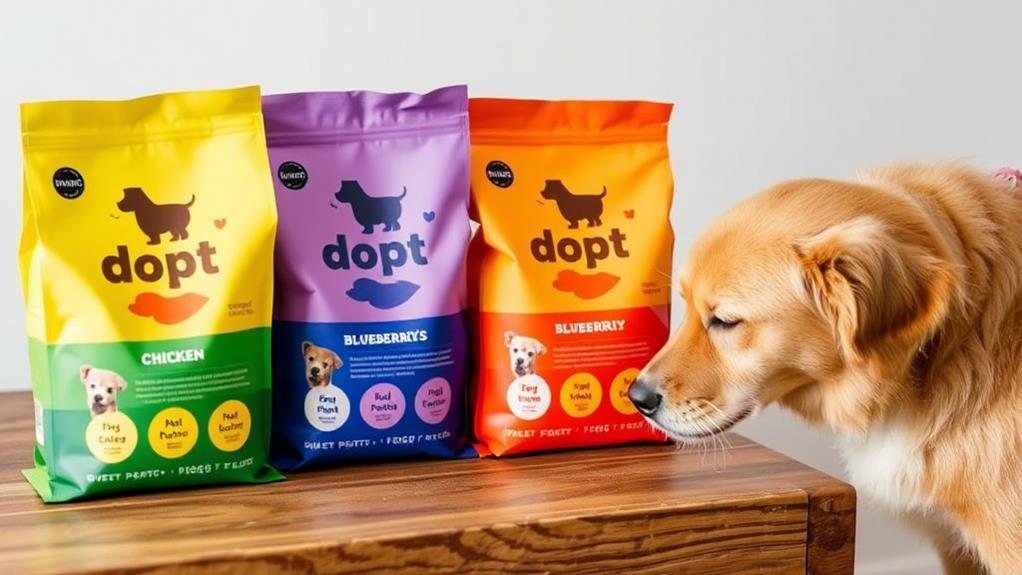
Understanding dog food labels can seem overwhelming, but grasping their key components is essential for making informed choices. Start with the ingredient list, which usually appears in descending order by weight. This helps you determine what your dog is primarily consuming. Look for high-quality protein sources, like chicken or beef, listed at the top.
Next, pay attention to the guaranteed analysis. This section provides information on the percentages of protein, fat, fiber, and moisture in the food. Confirm the protein content meets your dog's specific needs based on their age, size, and activity level.
Don't overlook the AAFCO statement, which indicates whether the food meets established nutritional standards. If the label states it's formulated for all life stages, it's typically suitable for puppies and adults alike.
Homemade vs. Commercial Dog Food
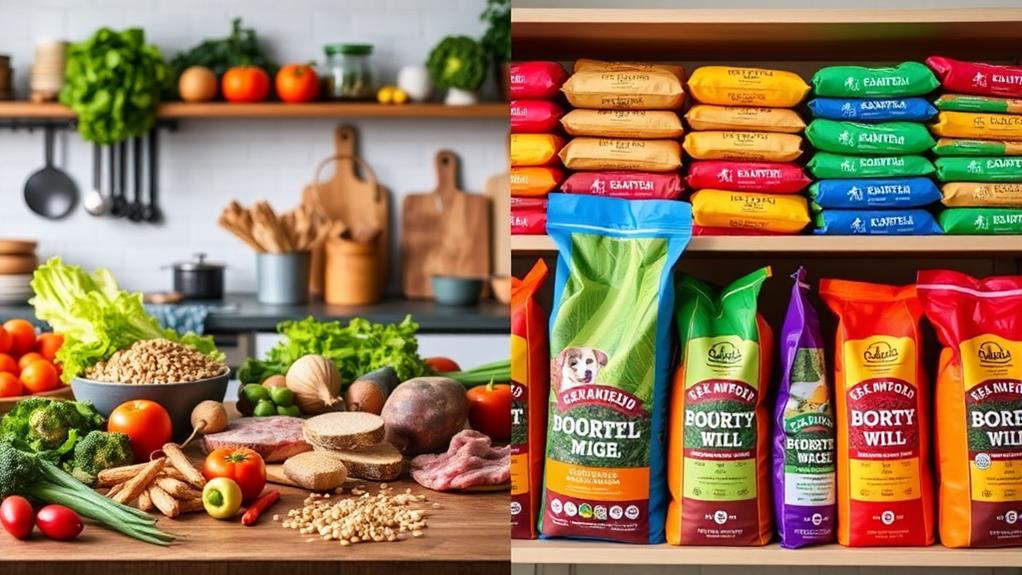
Choosing between homemade and commercial dog food can greatly impact your dog's health and happiness. Each option has its benefits and drawbacks, so it's crucial to weigh them carefully.
Homemade dog food allows you to control every ingredient, guaranteeing your furry friend gets fresh, high-quality nutrients. You can customize recipes based on your dog's specific needs and preferences, which can be particularly helpful if your dog has allergies or sensitivities. However, creating balanced meals requires careful planning and knowledge of canine nutrition to avoid deficiencies.
On the other hand, commercial dog food offers convenience. Many brands formulate their products to meet the nutritional standards set by the Association of American Feed Control Officials (AAFCO), which can simplify the process for you. Plus, commercial options come in various flavors and formulations, making it easy to find one your dog loves.
Ultimately, whether you choose homemade or commercial dog food, it must meet your dog's specific dietary needs. Don't hesitate to consult your veterinarian for guidance and recommendations tailored to your dog's unique health requirements. Your choice can contribute remarkably to your dog's overall well-being.
Common Dietary Restrictions

Many dogs face dietary restrictions due to allergies, sensitivities, or specific health conditions. You might notice your dog scratching more than usual, experiencing gastrointestinal issues, or having skin irritations. These signs can indicate food allergies or intolerances to common ingredients like wheat, soy, or certain proteins.
If your dog has a known allergy, it's imperative to eliminate the offending ingredient from their diet. For instance, if your dog is allergic to chicken, you'll need to choose a protein source that's safe, such as lamb or fish. Some dogs may also be sensitive to grains, prompting you to evaluate grain-free diets that use alternative carbohydrate sources like sweet potatoes or peas.
Additionally, certain health conditions, like diabetes or kidney disease, require specific dietary adjustments. Dogs with diabetes may need a low-carb diet, while those with kidney issues might benefit from lower protein and phosphorus levels. Consulting your veterinarian is essential in these cases to guarantee you're meeting your dog's unique nutritional needs while adhering to their dietary restrictions.
Paying close attention to your dog's health and dietary requirements will help keep them happy and thriving.
Supplements for Canine Health
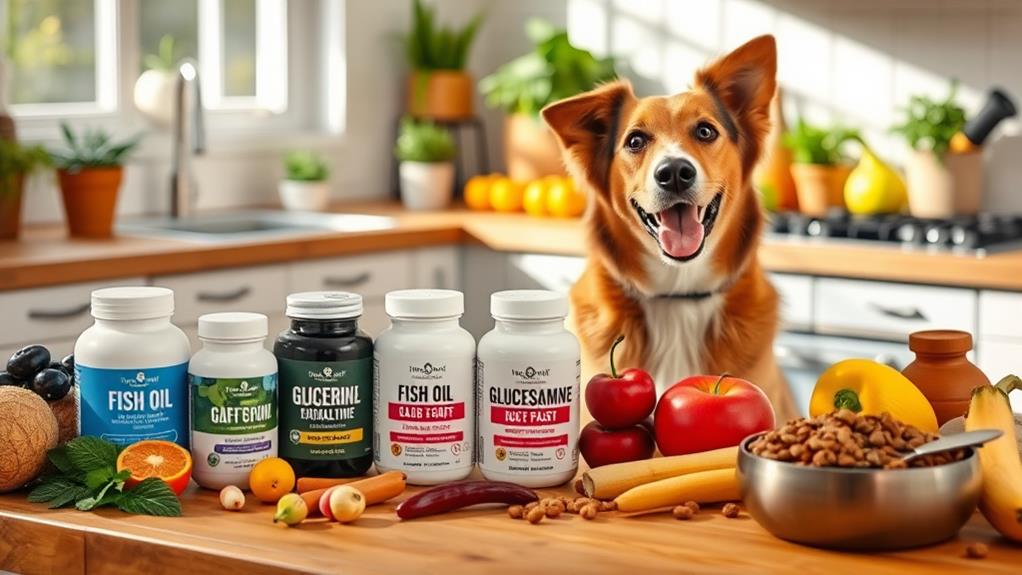
While addressing dietary restrictions is imperative for your dog's health, supplements can play a significant role in enhancing their overall well-being. Many dogs may not get all the nutrients they need from their regular diet alone, and that's where supplements come in. They can help fill nutritional gaps and support specific health needs.
When choosing supplements, consider your dog's age, breed, and any health issues they may have. For example, omega-3 fatty acids can promote healthy skin and coat, while glucosamine can support joint health, especially in older dogs. Probiotics can aid digestion and boost your dog's immune system, helping them stay vibrant and active.
Always consult your veterinarian before introducing any new supplements to guarantee they're appropriate for your dog's unique needs. They can help you determine the right dosage and recommend high-quality products. Remember, supplements aren't a substitute for a balanced diet, but they can be an excellent way to enhance your dog's health and happiness. By incorporating the right supplements, you can support your furry friend's vigor and longevity, ensuring they lead a healthy, active life.
Hydration and Its Benefits

Staying properly hydrated is essential for your dog's overall health and well-being. Water plays a pivotal role in maintaining various bodily functions, including temperature regulation, digestion, and nutrient absorption. When your dog is adequately hydrated, they're less likely to experience issues like kidney stones, urinary tract infections, or constipation.
Make sure your furry friend has access to fresh, clean water at all times. Dogs can lose a significant amount of water through panting, especially during hot weather or after exercise. If you notice your dog drinking less than usual, it might be a sign of dehydration, which can lead to lethargy and more serious health problems.
You can also keep your dog hydrated through their diet. Some dog foods contain higher moisture content, especially wet or canned varieties. Adding water or low-sodium broth to dry kibble can encourage your pup to drink more. Additionally, incorporating hydrating fruits and vegetables, like watermelon or cucumber, can be a delightful treat that boosts hydration.
Tailoring Diet to Life Stages
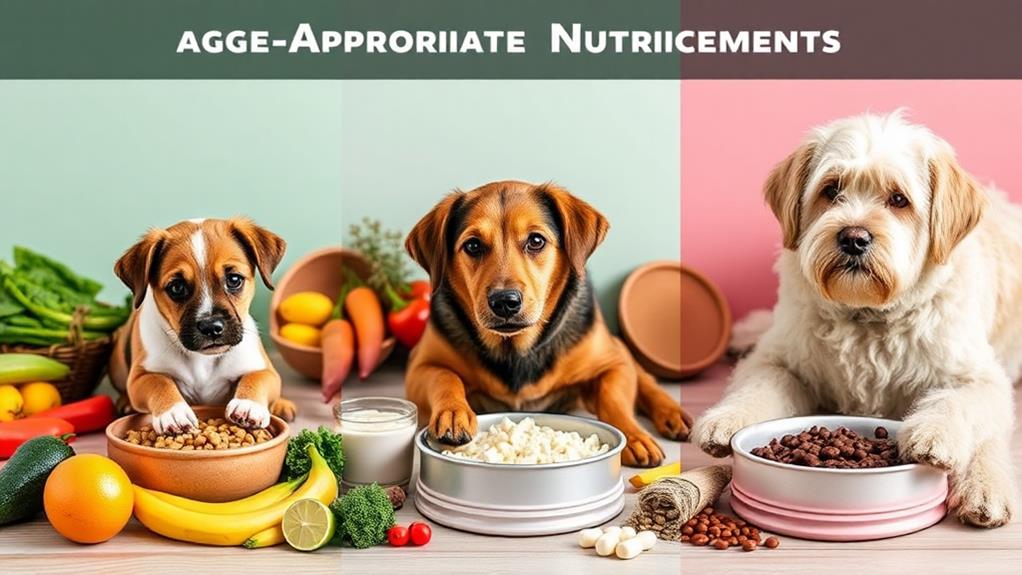
Understanding your dog's nutritional needs is crucial as they progress through different life stages. Puppies require a diet rich in protein and calories to support their rapid growth and energy levels. Opt for high-quality puppy food that contains essential nutrients, promoting healthy bones and muscles.
As your dog shifts into adulthood, their dietary needs change. An adult dog needs a balanced diet with the right mix of protein, fats, and carbohydrates to maintain their weight and energy. Monitor their activity level and adjust portions accordingly to prevent obesity.
Once your dog reaches their senior years, it's important to refine their diet again. Senior dogs may need lower-calorie food to avoid weight gain, along with added supplements to support joint health and digestion. Look for formulas specifically designed for older dogs, which often include omega fatty acids and fiber.
Throughout these stages, always consult with your veterinarian. They can provide tailored advice based on your dog's health, breed, and lifestyle. Regularly reevaluate your dog's diet to match their current needs, keeping them healthy and happy throughout their life.
Frequently Asked Questions
Can Dogs Be Vegetarians or Vegans Safely?
Yes, dogs can be vegetarians or vegans, but it's vital to guarantee they get all essential nutrients. You should consult a vet to create a balanced diet that meets their specific health needs.
How Do Allergies Affect a Dog's Diet?
Allergies can substantially impact your dog's diet. You might notice skin irritations or gastrointestinal issues. Identifying allergens helps you choose suitable foods, ensuring your pup stays healthy and comfortable while enjoying their meals.
What Are the Signs of a Nutritional Deficiency in Dogs?
If your dog suddenly loses interest in play, it might signal a nutritional deficiency. Watch for symptoms like lethargy, poor coat condition, or digestive issues. Regular vet check-ups help safeguard your pup stays healthy and vibrant.
Are There Specific Foods That Dogs Should Never Eat?
Yes, there are specific foods dogs shouldn't eat. Avoid chocolate, grapes, onions, garlic, and avocados. These can cause serious health issues. Always check labels and keep harmful items out of their reach to safeguard their well-being.
How Do I Transition My Dog to a New Diet?
To shift your dog to a new diet, gradually mix the new food with the old, increase the new portion over several days, and observe any changes in your dog's digestion and energy levels.
Conclusion
In the grand adventure of dog ownership, the right nutrition isn't just important—it's the secret sauce that transforms your pup into a vibrant, tail-wagging superstar! By feeding your furry friend a balanced diet packed with essential nutrients, you're not just keeping them healthy; you're revealing the ultimate happiness formula. So, let's ditch the mystery of dog food choices and embrace the power of nutrition—because a well-fed dog is a joy that could light up the darkest day!



